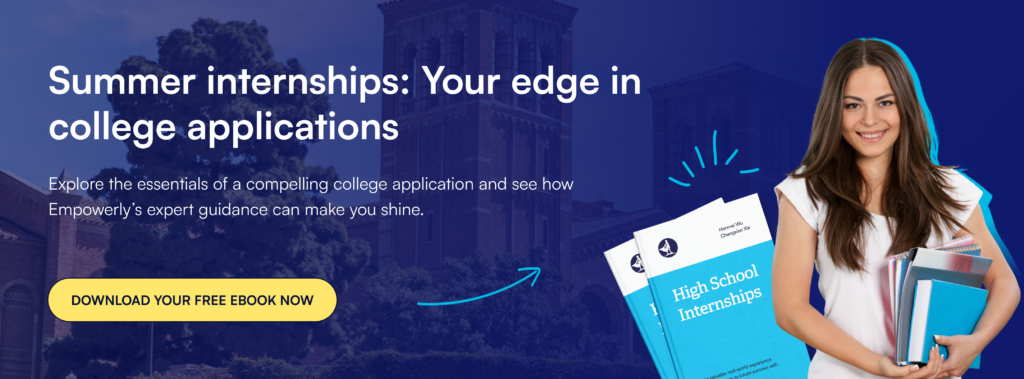Need ideas on how to build an impressive high school resume? Today’s college admissions offices are looking for more than just stellar grades on transcripts. They’re seeking well-rounded students with demonstrated initiative, leadership, and genuine passion in their pursuits. And with the competition for spots at top colleges intensifying each year, it’s essential for high school students to distinguish themselves.
So, how do you stand out from the crowd?
What’s the secret?
It’s all about strategic participation in extracurriculars that highlight your unique skills and unwavering commitment. By carefully selecting activities that both interest you and forge valuable skills, you can create a diverse, balanced resume that tells a compelling story about who you are and what you bring to the table—making the most of your busy schedule.
Here’s an informative video explaining the importance of a high school resume, plus tips and tricks for creating a polished resume:
Ready to learn more?
Let’s explore some impactful resume-building activities for high school students looking to make their mark.
Nine ideas for building out your high school resume
1. Leadership roles in school & other organizations
Taking on leadership positions demonstrates responsibility, teamwork capabilities, and problem-solving skills—qualities that immediately catch the attention of competitive admissions officers.
As a high school student, you can develop leadership skills by taking on roles in student government, serving as a club representative, or being a sports team captain. Organizing school events and mentoring younger students are other great ways to show meaningful intent and dedication. Taking initiative in group projects, starting a new club, or spearheading fundraising efforts further demonstrates leadership. Even part-time jobs or internships that involve training others or managing responsibilities can showcase valuable leadership experience.
These roles show that you’re not just a participant but someone who takes initiative and handles responsibility well. Leadership positions also provide valuable experience in managing teams, communicating effectively, and overcoming obstacles—skills that translate directly to college and workplace success.
So that’s it—I need to have held leadership titles?
No! Remember, leadership isn’t about having an impressive title. Document specific achievements, such as your impact on the club’s growth, successful events organized, money raised, and other positive changes implemented.
2. Community service & volunteer work
Volunteering not only strengthens your resume but also allows you to make a meaningful difference in your community. Consistent volunteer work demonstrates empathy, commitment, and social awareness. And the more unique and specific your efforts are to your interests and passions, the better.
Great! So where do I start?
Depending on your aspirations and goals, you’ll want to focus on activities that explore and strengthen your commitment to those areas. Maybe you consider activities like helping build temporary housing solutions for the homeless or conducting legal research at your local courthouse. You might tutor younger students or be a teacher’s assistant for summer classes. You could manage marketing campaigns for resource-strapped nonprofits or collect books to donate to underserved communities.
The opportunities are endless. Here’s a list of 20 community service ideas for high school students if you’re looking for fresh ways to get involved.
The important thing is to demonstrate genuine interest and action taken for causes that are important to you.
Tip: colleges and employers value long-term volunteer commitments over one-time activities. Remember that routine involvement shows genuine dedication rather than resume padding. Just be sure to track your volunteer hours so you can be poised to share specific impacts of your service when the time comes.
3. Internships & real-world job experience
Simply put, there’s no substitute for hands-on experience in professional environments. Early work experience demonstrates responsibility, time management, and an understanding of workplace dynamics.
Even the most entry-level positions in retail or the service industry teach essential workplace skills like punctuality, customer service, and handling responsibility. These experiences show colleges that you understand professional expectations and can balance multiple commitments.
So, what’s a good starting place for entry-level work?
Glad you asked! A fantastic place to start is with internships, particularly in the summer semester when you tend to have a bit more time (but any semester will do). Speak with your school counselor for possible opportunities and don’t be afraid to inquire directly with local businesses and other organizations on any internship possibilities. You might discover paid part-time opportunities or be able to shadow roles in areas of high interest to you.
At Empowerly, we offer our Research Scholar Program (RSP) and Startup Internships Program (SIP) at different times throughout the year—definitely take a look!
Regardless of which route you choose, keep in mind the high likelihood of interviews or application essays involved in landing a job or internship. Practice articulating your personal passions and academic and career interests in a way that makes potential employers and internship programs sit up and listen. You’ve got this!
4. Academic clubs & competitions
If you’ve got a competitive streak and thrive on intellectual challenges, academic extracurriculars can significantly strengthen your resume and help you develop crucial skills.
Some of the most popular pursuits include debate club and Model UN, mathlete clubs, school newspapers or literary magazines, robotics competitions, and coding groups. These activities showcase critical thinking, problem-solving abilities, and analytical skills. Success in academic competitions also demonstrates your ability to perform under pressure—a handy trait in both higher education and future work settings.
For the STEM aficionados, check out this list of 49 summer STEM programs for high school students we shared previously—many take place on a recurring schedule, so it’s good to explore new opportunities regularly.
Tip: when possible, pursue leadership roles within these groups or progress to increasingly advanced levels of competition to show growth and commitment.

5. Creative pursuits & passion projects
Professional experience and academic activities are great and all, but what about the arts?
Absolutely. Self-directed creative projects can make your resume uniquely memorable and demonstrate initiative, creativity, and intrinsic motivation.
Here are some versatile creative endeavors:
- starting a blog, social media page, or YouTube channel (focused on a topic you’re passionate about)
- writing and publishing articles, guest stories, or even publishing your own book!
- creating artwork for exhibitions, designing a clothing line for a fashion event, or participating in local theater
Colleges love students who apply knowledge in real-world settings. Personal projects show admissions officers and employers that you can dream up ideas and follow through on them independently. So, your side hustle could be the X-factor that makes your application stand out! It also provides tangible examples of your creativity and commitment that you can showcase in portfolios for interviews later.
The most impressive creative pursuits are those demonstrated consistently over time to show dedication rather than fleeting interest.
6. Competitive & recreational sports
Not the creative type? Athletic participation demonstrates discipline, teamwork, and perseverance—qualities highly valued in academic and professional settings.
Most often, these athletic opportunities involve:
- joining school or community group sports teams
- competing in individual sports like rugby, tennis, or golf
- taking on team captain responsibilities to showcase leadership abilities
Even recreational sports help develop teamwork and long-term commitment. Sports teach valuable lessons about handling success (and failure) with grace, time management, and pushing through tough challenges—all transferable skills for college and future careers.
When including sports on your resume, highlight specific achievements, leadership roles, and the soft skills developed through your participation. It’s not about the winning, but the wisdom learned and shared.
7. STEM & technology
In today’s digital world, technical skills can give you a significant competitive advantage.
Technical activities can demonstrate not only specialized skills but also show that you’re forward-thinking and adaptable to emerging technologies. These experiences are particularly valuable if you have a keen interest in STEM fields but can benefit any student in our technology-driven world.
Consider exploring tech-focused activities like coding competitions and hackathons, robotics challenges, designing websites, or building mobile apps.
Remember: it’s not just about the final product—document specific projects completed or technical skills mastered through these activities.
8. Study abroad & cultural exchange programs
International experiences demonstrate adaptability, cultural awareness, and a global mindset—increasingly important qualities in our interconnected world.
Ideas could be:
- foreign exchange student programs
- hosting exchange students in your home
- summer study abroad opportunities
Exposure to different cultures shows admissions offices that you can thrive outside your comfort zone and appreciate diverse perspectives. You just might pick up another language or two while at it—a fantastic skill to highlight on your college applications!
Tip: when describing your international experiences, focus on specific cultural insights gained and how the experience broadened your worldview.
9. Certifications & online courses
Self-directed learning through the pursuit of additional certifications shows initiative and a commitment to continuous improvement. Depending on your area of interest, you could consider taking language proficiency tests, technology certifications like for Google Analytics or Adobe Certified Professional (ACP), or coding and other certifications from Codecademy and Coursera.
Additional credentials show that you’re ready to go beyond minimum requirements to develop transferrable skills, signaling to colleges that you take a proactive approach to your education and professional development.
Explore more online learning platforms like Khan Academy, and edX offer numerous opportunities to earn certificates in specialized areas that align with your interests.

Final thoughts:
The strongest resumes showcase a strategic combination of leadership, community service, practical work experience, and passion projects. And rather than trying to do everything, focus on select activities that genuinely interest you and align with your long-term goals.
You’ve heard “quality over quantity.” That same principle rings true when fleshing out your high school resume. A documented history of involvement in meaningful activities is typically more impressive than surface-level participation across numerous activities. If possible, try to build your resume early on in high school, stay consistent and committed, and keep track of all your accomplishments along the way—big and small!
Remember: each experience not only enhances your resume but also helps you discover your strengths, fine-tune your interests, and develop skills that will serve you well throughout college and beyond. By taking action today, you’re investing in opportunities that will make your resume—and your future—shine brighter.
So, what’s next?
After filling out your schedule with select activities, it’s time to organize all that you’ve learned and experienced in a single document: the student resume. For tips on resume crafting, check out this guide on how to write a winning high school resume.
Keep in mind that these days, only having a traditional paper resume isn’t enough—digital portfolios are becoming the norm. If you’re building a resume for college applications down the road, consider creating an online portfolio or LinkedIn profile that highlights your multimedia projects like video, photography, or coding projects.
To get you started on the right foot, here are three top tips from our counseling team.
- Use industry-relevant terms: Instead of “helped with research,” try “conducted qualitative data analysis in a biotechnology research lab.”
- Show measurable impact: Instead of “volunteered at a food bank,” say “organized donation drives that provided 5,000+ meals to low-income families.”
- Use action verbs: Words like “led, innovated, launched, built, strategized” make a stronger impression.
Need extra help?
Fear not—Empowerly’s team of admissions experts and counselors are here to help you succeed. Whether you need one-on-one guidance, help with standardized tests, essay support, or are looking for more extracurricular opportunities, you can request a free intro call with us. Together, we’ll assess your application readiness and strategize ways to reach your college dreams.
